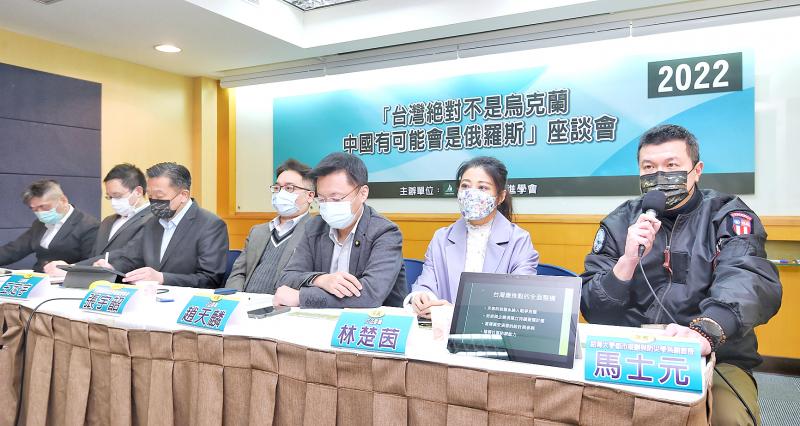Russia’s invasion of Ukraine should serve as a reminder to Taiwanese that dictatorships cannot be trusted, researchers and legislators said yesterday at a conference in Taipei held by the Strategy and Public Research Institute of Taiwan.
Speaking at the event, Institute for National Defense and Security Research research fellow Su Tzu-yun (蘇紫雲) said the invasion showed that agreements made with a dictatorship would be abandoned at the will of the dictator, citing the Molotov-Ribbentrop Pact and the Minsk agreements as examples.
The Molotov-Ribbentrop Pact was a non-aggression pact between Nazi Germany and the Soviet Union that was signed on Aug. 23, 1939, and broken on June 22, 1941, when Germany invaded the Soviet Union.

Photo: Fang Pin-chao, Taipei Times
The Minsk agreements, drafted in 2014, were aimed at ending war in Ukraine’s Donbas region, and were nullified on Tuesday last week when Russian President Vladimir Putin declared that the agreements “no longer existed.”
Russia had intended to fight a quick war, but has met strong resistance from Ukrainians, and is dealing with international sanctions and anti-war protests at home, Su said.
“If Russia is unable to take Ukraine in the next 48 hours, the situation will be unfavorable for Moscow,” he said.
Also speaking at the conference, Democratic Progressive Party Legislator Wang Ting-yu (王定宇) said that Chinese President Xi Jinping (習近平) appears to have expansionist ambitions similar to those of Putin, evidenced by China’s activities in the South China Sea, the East China Sea and the Taiwan Strait.
Dictators and their supporters try to justify their aggressions and blame their victims, DPP Legislator Chao Tien-lin (趙天麟) said at the conference.
“Putin claimed his invasion of Ukraine was to remove Nazi elements from the country,” he said. “You see the same in Taiwan, where pro-China elements have been blaming Ukraine for the invasion, saying it had provoked Russia.”
Such people are trying to change discourse in Taiwan by telling people not to provoke China, he said.
Maa Shyh-yuan (馬士元), an associate professor of urban planning and disaster management at Ming Chuan University, said at the conference that President Tsai Ing-wen’s (蔡英文) administration should express unity with Ukraine and think about ways of strengthening the nation’s resilience in the event of a disaster.
For example, war scenarios should be included in disaster response planning, and crucial businesses should be encouraged to establish plans to ensure sustainable operations in the event of a disaster, Maa said.
Taiwan could hold war response drills, and the fire department could be enlisted to help distribute disaster response supplies, such as is being done in Ukraine, he said.

A magnitude 4.9 earthquake struck off Tainan at 11:47am today, the Central Weather Administration (CWA) said. The hypocenter was 32.3km northeast of Tainan City Hall at a depth of 7.3km, CWA data showed. The intensity of the quake, which gauges the actual effect of a seismic event, measured 4 in Tainan and Chiayi County on Taiwan's seven-tier intensity scale, the data showed. The quake had an intensity of 3 in Chiayi City and County, and Yunlin County, while it was measured as 2 in Kaohsiung, Nantou County, Changhua County, Taitung County and offshore Penghu County, the data showed. There were no immediate reports of

Weather conditions across Taiwan are expected to remain stable today, but cloudy to rainy skies are expected from tomorrow onward due to increasing moisture in the atmosphere, according to the Central Weather Administration (CWA). Daytime highs today are expected to hit 25-27°C in western Taiwan and 22-24°C in the eastern counties of Yilan, Hualien, and Taitung, data on the CWA website indicated. After sunset, temperatures could drop to 16-17°C in most parts of Taiwan. For tomorrow, precipitation is likely in northern Taiwan as a cloud system moves in from China. Daytime temperatures are expected to hover around 25°C, the CWA said. Starting Monday, areas

A Taiwanese software developer has created a generative artificial intelligence (AI) model to help people use AI without exposing sensitive data, project head Huang Chung-hsiao (黃崇校) said yesterday. Huang, a 55-year-old coder leading a US-based team, said that concerns over data privacy and security in popular generative AIs such as ChatGPT and DeepSeek motivated him to develop a personal AI assistant named “Mei.” One of the biggest security flaws with cloud-based algorithms is that users are required to hand over personal information to access the service, giving developers the opportunity to mine user data, he said. For this reason, many government agencies and

Taiwan has recorded its first fatal case of Coxsackie B5 enterovirus in 10 years after a one-year-old boy from southern Taiwan died from complications early last month, the Centers for Disease Control (CDC) said yesterday. CDC spokesman Lo Yi-chun (羅一鈞) told a news conference that the child initially developed a fever and respiratory symptoms before experiencing seizures and loss of consciousness. The boy was diagnosed with acute encephalitis and admitted to intensive care, but his condition deteriorated rapidly, and he passed away on the sixth day of illness, Lo said. This also marks Taiwan’s third enterovirus-related death this year and the first severe